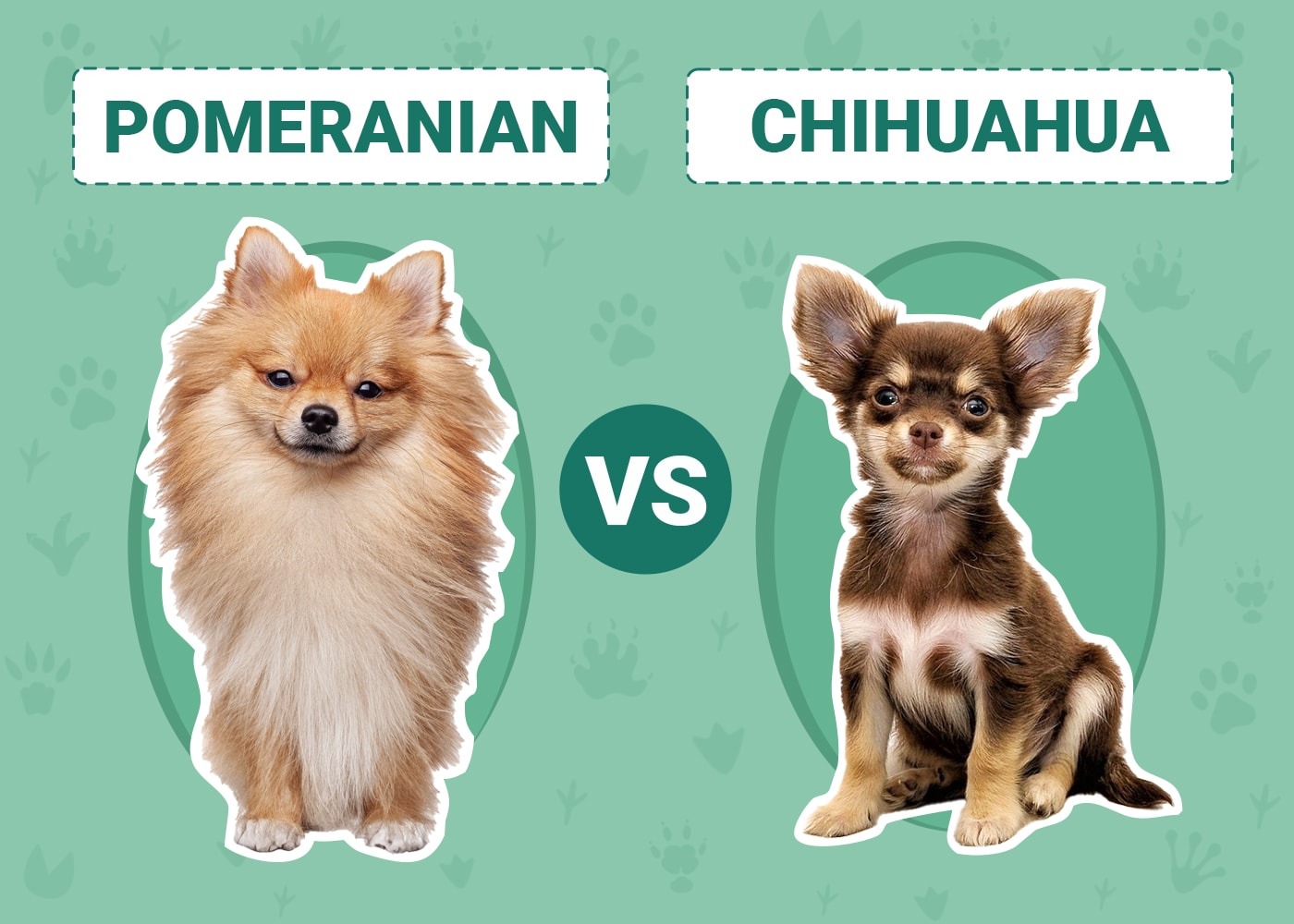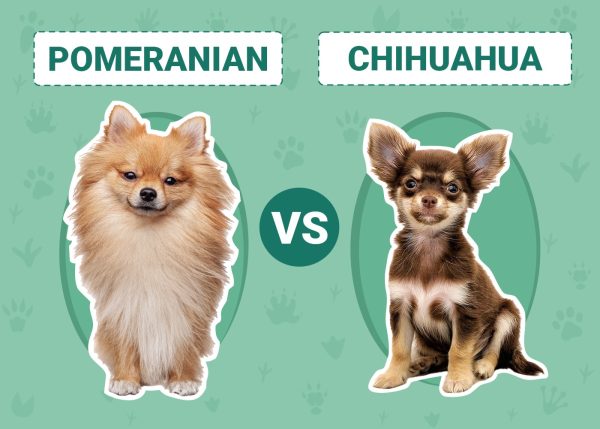It’s the battle of the toy breeds!
While Pomeranians and Chihuahuas have much in common, some stark differences set them apart. If you’re considering adopting one of these adorable yet feisty pups into your home, you must learn more about their personalities, training needs, and health. Neither breed is the perfect fit for just any home, so it’s best to familiarize yourself with both to find the ideal fit for your family and lifestyle.
Read on to learn more about the differences between Pomeranians and Chihuahuas to help make the decision-making process a smidge easier.

Visual Differences
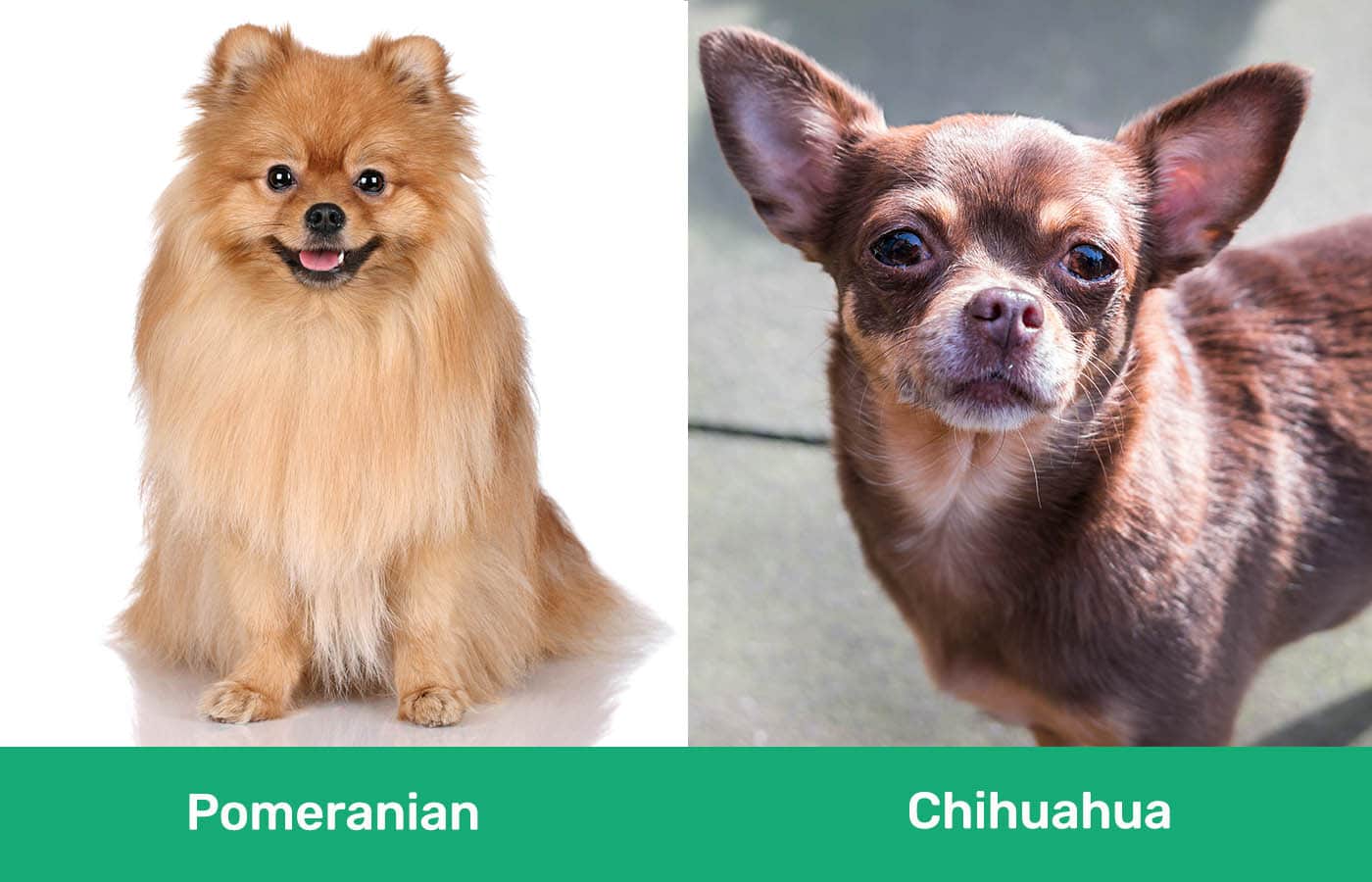
At a Glance
- Average height (adult): 8–11 inches
- Average weight (adult): 3–7 pounds
- Lifespan: 12–16 years
- Exercise: 30 minutes per day
- Grooming needs: Moderate
- Family-friendly: Yes, with older kids
- Other pet-friendly: Sometimes
- Trainability: Intelligent, easy to train
- Average height (adult): 6–15 inches
- Average weight (adult): <10 pounds
- Lifespan: 14–16 years
- Exercise: Minimum 30 minutes per day
- Grooming needs: Low
- Family-friendly: Yes, with older kids
- Other pet-friendly: Sometimes with cats
- Trainability: Self-willed, eager to please
Pomeranian Overview
Pomeranians are Spitz-type dogs named after the Pomeranian region in Central Europe. This toy breed is descended from a medium Spitz type, the German Spitz. They came to popularity after members of royalty began keeping them as pets. Queen Victoria is the most well-known royal Pomeranian owner. Her dog was smaller than other Poms of the time, igniting public interest in the smaller variety.
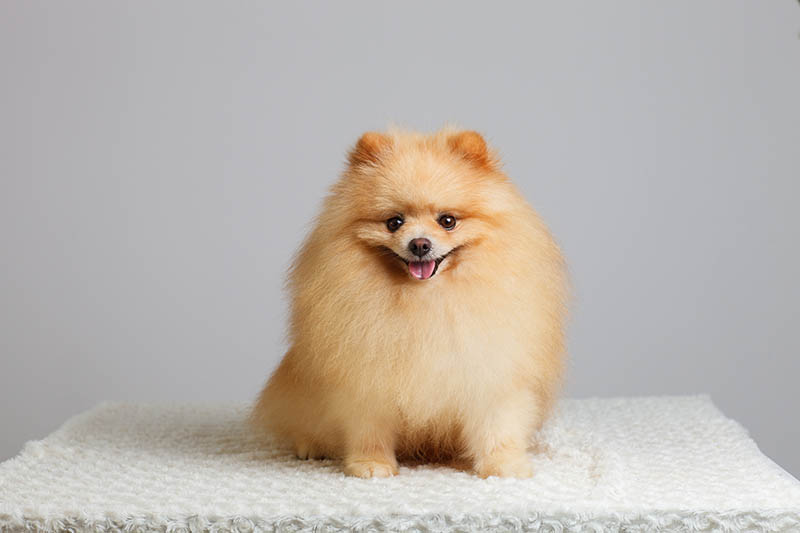
Personality / Character
Pomeranians may be small, but they have huge personalities. Don’t let its short stature fool you; this breed can make fine family watchdogs.
They’re highly intelligent, lively, and playful. Poms are extroverted and love to be the center of attention. That said, some have a streak of aggressiveness, where they can nip at other dogs and humans. They can also become dominant and stubborn if they’re not well-trained or socialized.
Poms, in general, can learn to live happily alongside other dogs and even cats.
Training
Training a Pomeranian is just as important as training any other dog breed. They sometimes develop a habit of barking excessively and can become defensive of their territory. The earlier you start training, the less likely it is that they will create such patterns.
Pomeranians respond well to praise and clicker training. In addition, most enjoy mentally stimulating activities and games, so it’s best to try incorporating these into your training sessions.
The Pomeranians wild coat requires much grooming, so potential owners must learn about touch desensitization. This will help keep your pup calm during grooming and prevent aggressive incidents.
The breed can be trickier regarding house training, so patience and consistency are key.
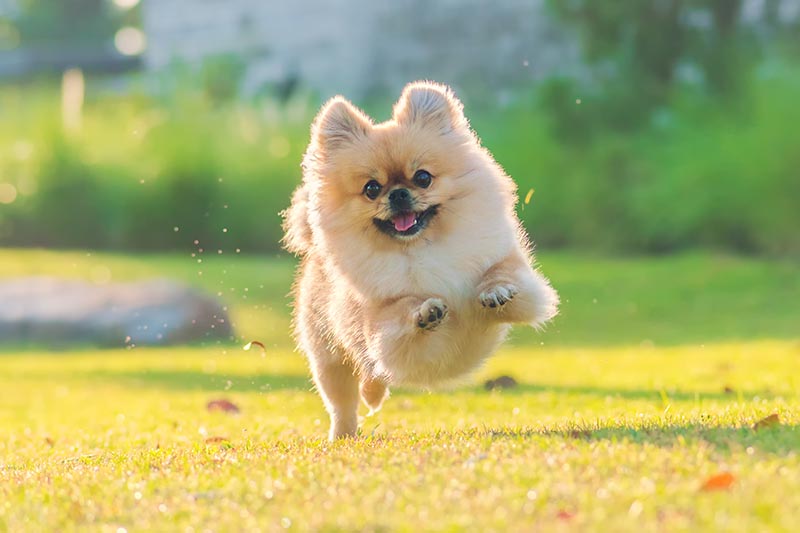
Health & Care
Pomeranians are generally healthy little pups with lifespans of up to 16 years. That said, they may be prone to certain health conditions.
Hypoglycemia occurs when there’s a sudden drop in blood sugar, and it’s most common in small dogs and puppies under three months.
Pomeranians may also be prone to eye issues such as keratoconjunctivitis sicca (dry eye), cataracts, distichiasis, and tear duct issues.
As with many other small dog breeds, Pomeranians are at higher risk of developing tracheal collapse. This occurs when the small cartilage rings that maintain the trachea’s shape become too flexible. When a dog with this condition goes to breathe air in, the rings flatten, and it can be difficult to get air into their lungs.
Some Pomeranians may develop skin or joint issues. If this is the case for your pup, you can talk to your vet about adding omega-3 fatty acids or joint supplements into its diet.
Suitable For:
Because they’re not overly dependent on their humans, Pomeranians are a great breed to choose if you have a busy lifestyle that keeps you out of the house many hours of the day. They’re also great for families with children that are old enough to know how to respect their canine family members. Finally, since they’re so small, they’re great for people who live in apartments as long as you’re trying to train them so they don’t bark excessively.
Chihuahua Overview
The Chihuahua is a Mexican toy dog named after the Mexican state Chihuahua. The breed was first noticed in the mid-19th century and is thought to be descendants of the Techihi, a now-extinct breed of mute dogs kept by the Toltec culture as far back as the 9th century.
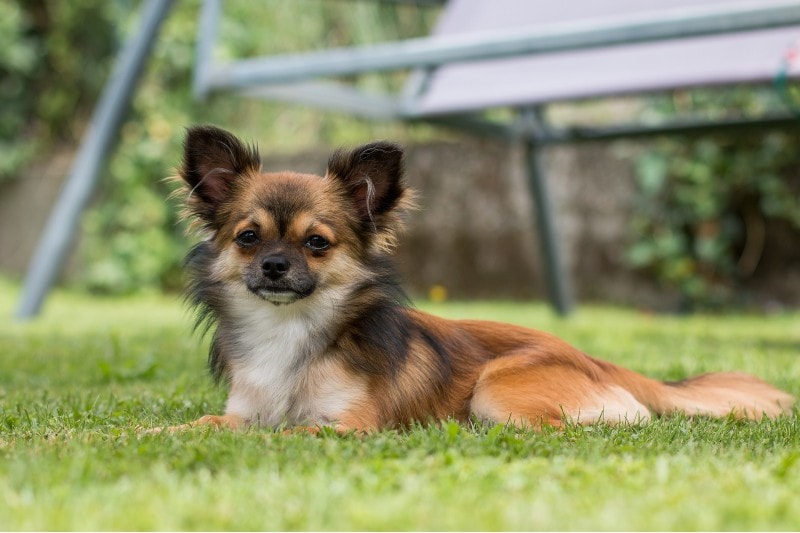
Personality / Character
We can thank the circa 2000s Paris Hilton for perpetuating the myth that all Chihuahuas are lap dogs. Any Millennial can recall when the heiress would carry her sweet little pup around in her purse like a fashion accessory. While Chihuahuas can be lap dogs, most new owners are surprised to find out that they’re highly energetic and would prefer running and playing to sleeping (or being toted around in a purse, we imagine).
Chihuahuas are playful and affectionate. They’re quick to bark, making them excellent watchdogs, but their small size makes them ineffective protectors. They can be weary around strangers and are less likely to be friendly toward other dogs.
Training
Like Pomeranians, Chihuahuas can be feisty, and many don’t realize just how small they are. They are bold and unafraid to challenge much larger dogs. Therefore, it’s very important for training to begin as soon as possible with a Chihuahuas puppy. Unfortunately, their small size can make them difficult to train, but with time and patience, anything is possible.
Chihuahuas are spunky and intelligent and need consistent obedience training to stay on their best behavior. They do best with varied and short training sessions. Set yourself up for success by training them on an empty stomach with yummy treats and praise to keep them engaged.
House training a Chihuahua is difficult. They’re tiny and sneaky, so you’ll likely find them toileting around your home in secret places until they’ve been completely house-trained.
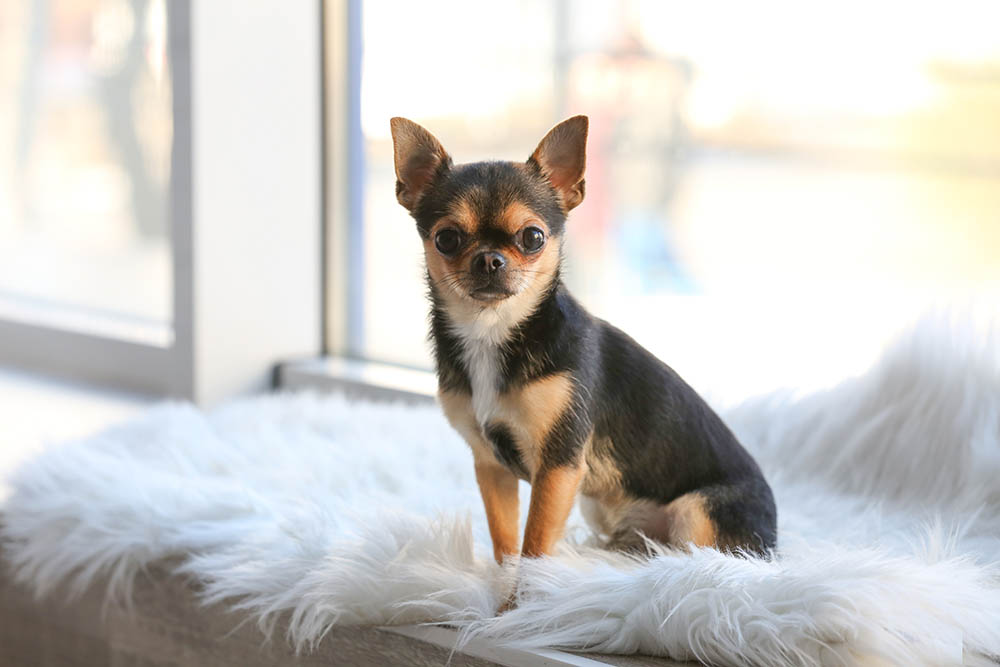
Health & Care
Like Pomeranians, Chihuahuas have very long lifespans. In fact, they’re one of the longest-living breeds, living on average between 14 and 16 years. However, though they’re generally healthy, they have some conditions they may be prone to.
Obesity is a preventable condition that is common in Chihuahuas. Unfortunately, weight gain can be hard to recognize, especially in long-haired Chihuahuas. Still, all owners need to keep tabs on their pet’s weight as canine obesity can lead to other secondary issues like diabetes or heart disease.
Chihuahuas may develop medial patellar luxation as there may be a significant hereditary component. This condition occurs when the kneecap slips out of its usual position. However, it will sometimes return to its rightful position on its own, though surgery is sometimes necessary.
Heart failure is the leading cause of death in senior Chihuahuas. Seventy-five percent of heart disease causes are caused by valve deterioration which can sometimes be caught with a stethoscope. If your Chihuahua has a heart murmur or other signs of heart problems, it’s highly recommended that you perform further testing to determine the severity of the disease.
Suitable For
Chihuahuas don’t have high exercise requirements, so they’re a great option for senior owners or families who don’t have much time to commit to hours of exercise per day. Their compact size makes them perfect for apartment or city life, but because they’re barky, they need proper training to live harmoniously with uptight neighbors. They can make great family pets when treated respectfully and fully trained but may snap at strangers or small children whom they deem threatening.
Which Breed Is Right for You?
Pomeranians and Chihuahuas have a lot in common. They’re both small, feisty, with bigger-than-life personalities. Despite their short stature, they both believe they’re much larger than they are and can be prone to streaks of aggressiveness.
If you have other pets, you’ll need to consider their needs before bringing a new puppy home. For example, Pomeranians can get along well with other dogs and cats after socialization, while Chihuahuas are less likely to befriend other dogs. That said, many Chihuahua owners report their dogs being well-behaved around cats after they’ve been properly introduced and socialized.
Regardless of which breed you ultimately decide is right for your family, proper training and socialization are key. Without training, you could have a snappy, ill-behaved, and yappy pup on your hands.
Featured Image Credit: (L) Jumpstory | (R) Galina Kovalenko, Shutterstock

